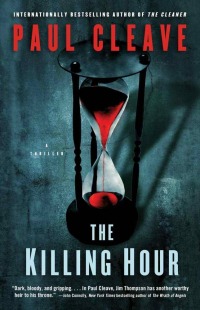The Killing Hour by Paul Cleave
 Wednesday, April 24, 2013 at 7:43PM
Wednesday, April 24, 2013 at 7:43PM 
Published by Atria Books on April 23, 2013
The Killing Hour takes place in Christchurch, New Zealand. An author's note tells us that the novel was originally written as a horror story. It didn't sell and, to make it marketable, Paul Cleave rewrote it as a crime novel. The Killing Hour retains the creepy feel of a horror story, which is good and bad. Good because creepy is fun, bad because the creepy events that transpire in horror stories tend to be predictable.
Charlie Feldman's story -- the confusing story he tells Jo, the wife who separated from him six months earlier when he beat up a man in a bar -- is that he met a blood-covered woman on the road who told him her friend was being held by a lunatic. He went into the forest at night and found a woman tied to a tree being threatened with a metal stake by a guy named Cyris. He thought he killed Cyris but now Cyris is after him. The rest of Charlie's improbable story is unveiled, bit-by-bit, as the novel progresses. Having watched the news, both Charlie and Jo know that two women were recently found dead. Charlie, with good reason, worries that he'll be the prime suspect in their murders. Jo becomes embroiled in his ordeal as she -- like the reader -- wonders whether Charlie is a delusional murderer or an improbable victim.
The case is assigned to Detective Inspector Bill Landry who, with six months to live, has no incentive to follow the rules of criminal investigation. He's becoming a guy who is willing to do bad things for good reasons, a trait he despises in others. Mistaking vigilantism for justice, Landry makes it his mission to rid the world of Charlie. As a Dirty Harry wannabe, Landry is a stereotype, but he's more interesting than most stereotypical vigilante cops.
The first half of The Killing Hour, with all its unanswered questions, engages the reader's mind. The second half requires little thought, including a final chapter in which Charlie struggles (but not for long) with a moral decision. The plot isn't particularly believable, given its dependence on an evil character who has an almost superhuman ability to endure pain and survive injuries that would kill most people, but that's become standard thriller fare. The vestiges of the horror novel this once was, including a couple of ghosts, could have been eliminated entirely without doing harm to the story.
The Killing Hour is predictable and formulaic, but it's also fast moving and enjoyable (at least for fans of mayhem). The action scenes in The Killing Hour are vivid, particularly the gruesome ones. The excitement factor is high even if the story holds no surprises. Predictable endings can still be satisfying, and that holds true as The Killing Hour's relentless violence finally reaches a climax. Had The Killing Hour maintained the suspense it generates in the first half, it would have been a better novel, but as it stands, it isn't bad.
RECOMMENDED
 TChris |
TChris |  Post a Comment |
Post a Comment |  Paul Cleave,
Paul Cleave,  Recent Release in
Recent Release in  Thriller
Thriller 


